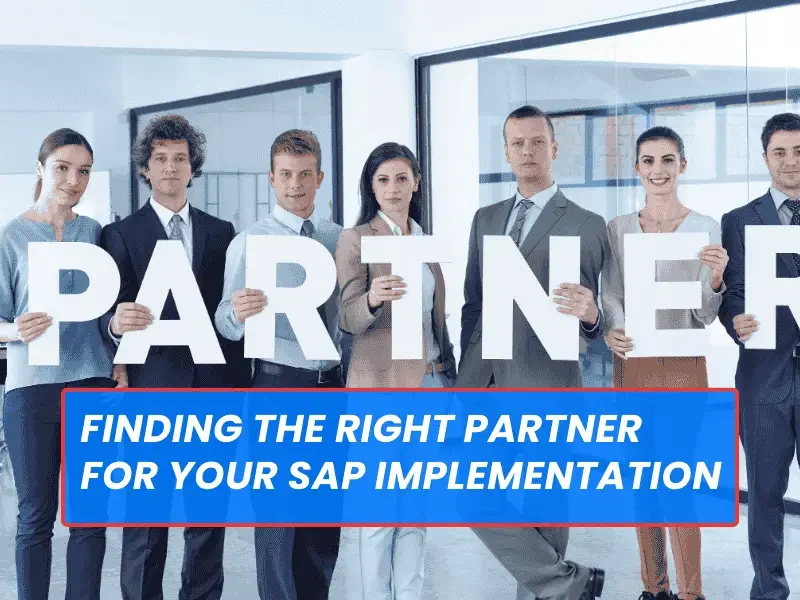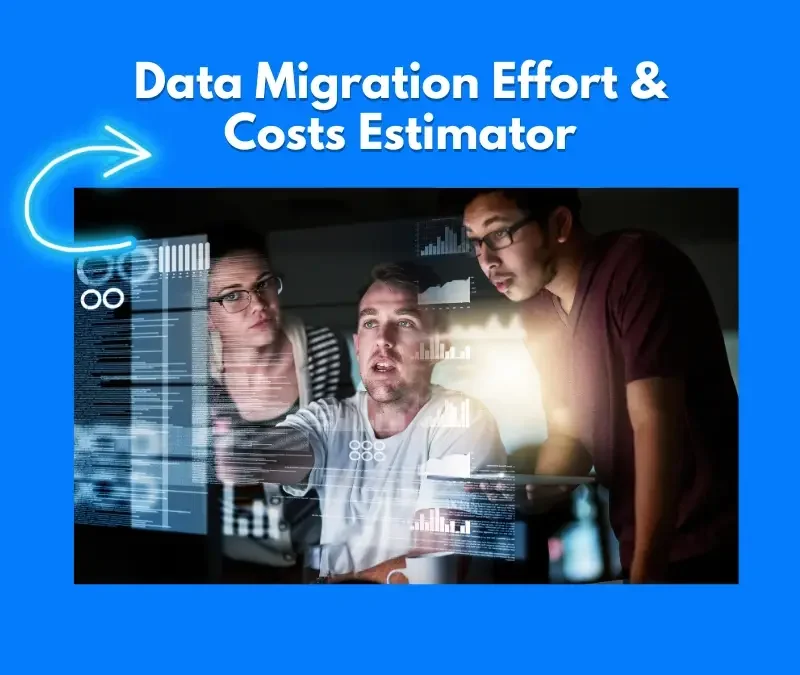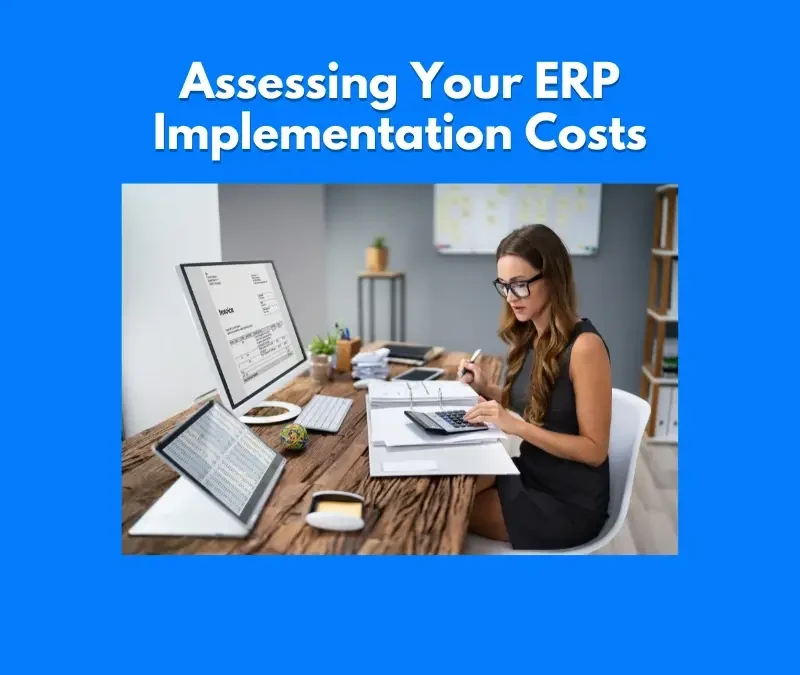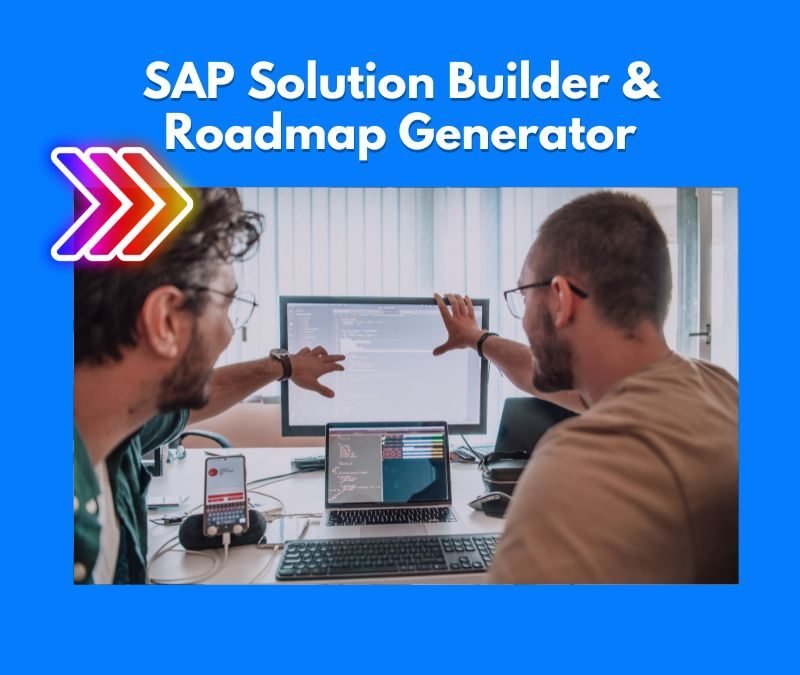SAP Articles
SAP Implementation Partners in USA: Must-Know List
Noel DCosta
- Last Update :
Let’s talk about SAP projects. They cost a lot of money and some even hit the billion-dollar mark. Picking the right SAP Implementation partner in the USA (if you are in the USA) is extremely important. If you choose the wrong partner, you’ll watch your project stall, your budget explodes, and your team get frustrated.
Here’s a common mistake I see: Many companies pick partners just because they’re well-known. That’s a HUGE mistake! A partner’s size doesn’t guarantee they’ll do a good job. Some firms are great at huge transformations, while others work best with medium-sized companies or specific industries.
What you really need is a partner with the right mix of know-how, industry experience, and reasonable costs. When you’re looking at potential partners, ask yourself:
- Do they really understand what makes your industry tick?
- How do they plan, execute, and support your project from start to finish?
- Can they handle a business of your size and complexity, both now and as you grow?
The fact of the matter is the partner you choose today will affect how well your business runs, how you stack up against competitors, and your bottom line for years to come. My advice is don’t rush this decision. Take your time to find the right fit rather than just going with the most famous name out there.
So how do you choose the right SAP Implementation partner? This article is all about that.

Picking the right tier matters. Choose wrong, and you’re overpaying or under-supported. This guide breaks down the top SAP partners in the U.S. by tier so you can find the best fit for your business. Let’s get started.
SAP Implementation Partners in the USA: Finding the Right Fit
Choosing the right SAP implementation partner in the USA is not just about certifications or size. It’s about finding a team that fits your business, your timeline, and your level of SAP maturity. Some partners specialize in public sector rollouts.
Others focus on manufacturing, retail, or fast-growing mid-sized companies. I’ve worked with firms where a mismatch with the partner delayed the project by months. It helps to understand the tiers, the delivery models, and where they’ve succeeded before.
The right partner can cut costs and speed up delivery. The wrong one? It adds confusion, rework, and unnecessary complexity.
Tier 1 SAP Implementation Partners in the USA
Tier 1: Enterprise-Level Consulting Firms
Tier 1 SAP implementation partners are usually selected when the stakes are high. These are the big firms. Large programs. Complex landscapes. Global rollouts. You do not bring them in just to optimize a report or fix a workflow. In the US, Accenture, Deloitte, DXC Technology, and IBM are typically the names you see at the top of that list.
That said, each one has its own flavor. And in my experience, choosing between them depends less on the name and more on how they fit your actual needs.
Accenture
They move with structure. Their preconfigured solutions can cut down delivery time, especially if you align early. But, in some cases, it may feel too rigid. One project I joined mid-stream had to untangle a few standard templates before adapting to actual business needs. The structure works, as long as it fits.Deloitte
I’ve seen them do well in industries like healthcare and government. They combine business advisory and SAP execution in a way that makes it easier for leadership teams to stay engaged. A colleague once told me they were the first vendor he worked with that actually translated technical speak into business terms during Steering Committee updates.DXC Technology
They usually bring in technically strong teams. Especially helpful if your SAP rollout includes legacy systems or a lot of integration work. I remember one manufacturing client who already used DXC for infrastructure. Adding them to lead SAP just made sense. It was familiar ground.IBM
IBM can be a powerhouse when it comes to hybrid SAP environments. Particularly during ECC to S/4HANA migrations. Their governance approach is detailed, though I’ve noticed some clients find it a bit heavy. If your internal teams are lean or used to more agile delivery, it can feel like overkill. But the technical expertise is solid.
If you are evaluating a Tier 1 partner, I think it helps to look at more than just the proposal or brand reputation. Sit with the team. Ask how they would handle your specific constraints. Sometimes it is not about who is the biggest, but who will actually stick around when things start to go sideways.
| Company | Vendor Specialties | Ratings (Gartner & Forrester) |
|---|---|---|
| Accenture | RISE with SAP, global S/4HANA transformations, industry cloud | Leader (Gartner MQ), Leader (Forrester Wave) |
| Deloitte | Finance & tax transformation, BTP, public sector, life sciences | Leader (Gartner MQ), Leader (Forrester Wave) |
| IBM | SAP AI, hybrid cloud migration, regulated industry focus | Leader (Gartner MQ), Leader (Forrester Wave) |
| Capgemini | Customer Experience, SAP S/4HANA Cloud, utilities sector | Leader (Gartner MQ), Strong Performer (Forrester Wave) |
| TCS | Global template rollout, managed SAP services, industry accelerators | Challenger (Gartner MQ), Strong Performer (Forrester Wave) |
| Infosys | SAP BTP, manufacturing & supply chain, automation-driven delivery | Visionary (Gartner MQ), Strong Performer (Forrester Wave) |
| NTT DATA | SAP application management, infrastructure, and cloud hosting | Challenger (Gartner MQ), Contender (Forrester Wave) |
| Wipro | SAP modernization, CPG and retail, cloud migration | Niche Player (Gartner MQ), Contender (Forrester Wave) |
| DXC Technology | Public sector SAP, SAP managed services, legacy modernization | Niche Player (Gartner MQ), Not Rated (latest Forrester) |
Tier 2 SAP Implementation Partners in the USA
Tier 2: Mid-Sized and Large Business Experts
Tier 2 SAP partners sit between the global giants and the boutique firms. They have scale, but they still feel approachable. I like working with them when a project is too big for a local shop yet does not need the full weight of a Tier 1. Results vary, of course. Some teams adapt quickly, others hold tight to their playbooks. That mix keeps things interesting.
Birlasoft
Mid-market S / 4HANA, discrete manufacturing. Their consultants move fast, though I sometimes find their documentation a touch light. A follow-up checklist usually fixes that.Tech Mahindra
Strong in telecom and logistics. They bring SAP BTP skills to the table. A colleague once said their handovers felt rushed. I saw that too, but the fixes came quickly when flagged early.HCLTech
Good choice for cloud-first migrations or AMS. Gartner calls them visionary. In practice, they solve infra issues without much fuss. I think their functional depth varies by region.Atos
Public sector and defense projects, plenty of EU experience. Their style is methodical. Some teams love the structure, others find it slow. It depends on how tight your timeline is.BearingPoint
Focused on energy and utilities. They speak the industry language, which helps. One utility client appreciated their scenario workshops, although the price surprised finance.Syntax Systems
SAP hosting and manufacturing for mid-sized firms. Quiet operators. They keep costs steady, but you may need to push for extra change-management support.Delaware
Template-based rollouts for industrial companies. Efficient when the client process fits the template. Less so when custom gaps appear. A few extra blueprint sessions usually sort that out.Seidor
SAP Business One and S / 4HANA Cloud for SMEs, especially in LATAM. Friendly rates, solid regional knowledge. Scaling beyond the initial scope can feel slow, yet the core work is sound.
Choosing among these partners rarely comes down to brand alone. Sit with the proposed lead, walk through your edge cases, and watch how they react. That small test often tells you more than any formal proposal.
| Company | Vendor Specialties | Ratings (Gartner & Forrester) |
|---|---|---|
| Birlasoft | SAP S/4HANA mid-market implementations, discrete manufacturing | Not Rated (Gartner), Contender (Forrester Wave) |
| Tech Mahindra | SAP in telecom, logistics, CX solutions with SAP BTP | Niche Player (Gartner MQ), Not Rated (recent Forrester) |
| HCLTech | SAP AMS, cloud-first migration, infrastructure support | Visionary (Gartner MQ), Contender (Forrester Wave) |
| Atos | Public sector and defense SAP projects, EU coverage | Challenger (Gartner MQ), Not Rated (recent Forrester) |
| BearingPoint | SAP for energy, utilities, and government transformation | Not Rated (Gartner), Contender (Forrester Wave) |
| Syntax Systems | SAP cloud hosting, manufacturing sector, mid-sized enterprises | Not Rated (Gartner), Not Rated (Forrester) |
| Delaware | SAP S/4HANA for industrials, template-based rollouts | Not Rated (Gartner), Not Rated (Forrester) |
| Seidor | SAP Business One and S/4HANA Cloud for SMEs, LATAM & Europe | Not Rated (Gartner), Not Rated (Forrester) |
Tier 3 SAP Implementation Partners in the USA
Tier 3: Niche and Small Business Specialists
Tier 3 SAP partners are typically smaller consulting firms or niche players. They focus on specific industries, geographies, or functional areas. Some of them are former SAP consultants who decided to go independent or build tight-knit teams. The upside is usually flexibility, responsiveness, and cost. But that often comes with trade-offs—limited global reach, or fewer resources during peak phases. I have worked with a few Tier 3s that punched above their weight. Others needed more support than they could provide.
Here’s how I’d break it down:
Boutique Focus
Many Tier 3 partners specialize deeply. For example, one might be excellent at SAP FICO but not touch logistics. That works if you have a narrow scope. But if the project grows or shifts, you may outgrow their capacity.Closer Relationships
With a smaller team, you often get the same people from kickoff to go-live. That helps with continuity. One client told me they preferred Tier 3s because “we get the A team every time,” which is not always true with bigger firms.Faster Decisions, Less Bureaucracy
No long chains of approvals or overloaded governance models. Decisions are quicker, which is great when timelines are tight. But this speed can sometimes mean shortcuts. For example, I once had to rework cutover documentation that was skipped “to save time.”Support Limitations
If a key consultant falls sick or resigns, the bench strength may be thin. During one project, the ABAP lead from a small firm took leave mid-testing. They had no immediate backup. We had to borrow help from another team.More Willing to Adapt
I have seen Tier 3 firms go the extra mile to tailor their approach. They listen more, adjust faster, and often feel like part of the internal team. But they may need extra guidance on documentation or risk reporting.
Tier 3 can be a smart choice if your project is well-defined and your internal team is experienced. Just make sure you set expectations clearly. And keep a close eye on deliverables, especially when the pace picks up. That balance of cost, flexibility, and oversight can work well if you manage it right.
| Company | Vendor Specialties | Ratings (Gartner & Forrester) |
|---|---|---|
| Vision33 | SAP Business One and SAP BTP services for SMBs | Not Rated |
| Illumiti (a Syntax company) | Mining, engineering, and professional services with S/4HANA | Not Rated |
| Avaso Technology | SAP rollout and local support in APAC, EMEA, LATAM | Not Rated |
| Fujitsu (Regional SAP Consulting Arm) | Manufacturing-focused SAP services, especially in Japan/APAC | Not Rated |
| Beyond Technologies | Retail and consumer SAP solutions, based in Canada | Not Rated |
| Incture | SAP BTP apps, digital workflow, and intelligent automation | Not Rated |
| NIMBL | SAP S/4HANA services for US mid-market and government | Not Rated |
| XITASO | Custom SAP integration and UX design for manufacturing | Not Rated |
Other Tier 3 and Tier 4 Vendors...
| Company | Vendor Specialties | Ratings (Gartner & Forrester) |
|---|---|---|
| Itelligence (now NTT DATA Business Solutions) | SAP S/4HANA for SMEs, SAP CX, long-standing SAP-only focus | Not Rated (individually, now part of NTT) |
| Savantis | SAP Hospitality, Retail, SAP Business One, mid-market delivery | Not Rated |
| Dynamo | SAP S/4HANA for industrials, SAP Analytics Cloud, Canadian region | Not Rated |
| Beyond Technologies | Retail, CPG-focused SAP solutions, headquartered in Canada | Not Rated |
| Delbridge Solutions | SAP CPM, BPC and cloud planning, financial consolidation | Not Rated |
| ERP Logic | SAP Business ByDesign and cloud ERP for fast-growing firms | Not Rated |
| NIMBL | SAP DevOps, AMS, and U.S. public sector SAP services | Not Rated |
| Aasonn (an Rizing company) | SAP SuccessFactors implementation and HXM advisory | Not Rated (now under Rizing, acquired by Wipro) |
| CNT Management Consulting | SAP logistics and manufacturing focus, active in Austria/CEE | Not Rated |
| Incloud | SAP CX and Salesforce integration, SAP Marketing Cloud | Not Rated |
Choosing the Right SAP Partner
I’ve been in the consulting world as an ERP consultant for the last 20+ years. Take it from me, picking the wrong partner will impact your business for years. I’ve seen companies waste millions by choosing partners that didn’t match what they actually needed. They just went for the name!
In March 2024, I watched a manufacturing client go with a Tier 1 firm for their mid-sized operation. Complete overkill. They paid twice what they should have, and the implementation took longer because the big firm’s processes were too heavy for their needs.
On the other hand, I’ve seen a government agency go with a Tier 2 Company. The outcome was a failed implementation, lost 18 months of time, litigation and embarrassment.
When selecting the right partner, please don’t go by impressive presentations or brand recognition. It’s about finding the right fit. I’ve seen this mistake repeatedly: companies get impressed by big names when what they really need is focused expertise.
Related Topics: Choosing the Right SAP Implementation Partner
Negotiation Advisors for SAP Deals
Your partner choice affects pricing. Use negotiation experts to control costs and contract risks.
Who Should Be on Your SAP Project Team?
A strong team complements your partner. Know the internal roles that matter most.
How to Start SAP Projects with Better Alignment
Early alignment with your partner helps avoid rework and missed expectations later.
Build Your SAP Business Case Before Choosing a Partner
Partners align better when you have a clear value case driving the engagement.
How to Choose the Right SAP Implementation Partners in the USA
Few decisions worry executives more than picking an SAP partner. The wrong choice can lock a company into cost overruns, strained teams, and a system everyone dreads logging into.
I have walked into projects where weekly status calls sounded calm, yet finance knew the budget was slipping fast. That tension grows when a partner talks big on strategy but sends junior consultants to do the heavy lifting.
Your fear is understandable. You need a team that proves it can keep timelines realistic, protect data integrity, and guide people through change without letting everyday operations stall. At the same time, you want flexibility.
Partners must adjust when regulations shift or an acquisition appears out of nowhere. Balancing those needs is hard. The following guide breaks down practical steps to evaluate capability, culture fit, and accountability, so your decision feels less like a gamble and more like a calculated move.
1. Match the Partner Tier to Your Project
Tier 1 Partners work best for global enterprises and complex transformations. If your business spans multiple countries, needs heavy customization, or wants a mix of cloud and on-premise, these firms have the resources to handle it. Just be ready for their premium prices.
Tier 2 Partners hit the sweet spot for mid-sized companies. They deliver solid expertise without the Tier 1 price tag while still providing enterprise-quality solutions. Most of my clients find the best value here.
Tier 3 Partners are perfect for smaller businesses, targeted solutions, and cloud implementations. When you just need SAP Business One, specific S/4HANA modules, or a quick deployment, these specialists deliver without unnecessary overhead.
2. Industry Knowledge Makes or Breaks Projects
SAP isn’t one-size-fits-all. A manufacturing company needs supply chain tools, while a retailer depends on inventory and e-commerce integration.
I once watched a client choose a partner with zero experience in their regulated industry. Six months later, they were still struggling with compliance issues that a specialized partner would have solved in the first week.
- Demand real case studies in your specific industry
- Ask tough questions about their experience in your field
- Check if they’ve built solutions for businesses like yours
3. The Money Question
Tier 1 firms handle billion-dollar projects and charge like it. I’ve seen clients pay double what they needed to by going with big names for straightforward implementations.
Tier 2 firms balance cost and expertise. They’re usually right for mid-sized rollouts where you need quality without breaking the bank.
Tier 3 firms keep costs in check without cutting corners on what matters to your business.
4. Look Beyond the Sales Pitch
Don’t fall for slick presentations:
- Check their actual SAP certifications that matter for your project
- Ask about similar projects they’ve completed successfully
- Make sure their consultants know the modules you need
- Talk to their current clients, not just their references
Last year, I steered a manufacturing client away from a big-name firm to a specialized Tier 2 partner. They finished on time and under budget – their first successful SAP project after two failed attempts.
5. Red Flags I’ve Learned to Spot
- Timelines that sound too good to be true
- Pricing that doesn’t clearly show what you’re getting
- No real experience in your specific industry
- Consultants who talk more than they listen
The Bottom Line The partner you choose today will affect how your business runs, how you compete, and your bottom line for years. Don’t rush this decision. Take your time to find the right fit rather than just going with the most famous name out there.

See How I Make Your ERP and AI System Selection or Implementation right for you.
ERP & AI System Selection – Identify and choose the right ERP or AI-enabled platform to fit your business needs.
Project Support & Recovery – Keep your project on track or bring failing implementations back under control.
ERP Modernization – Transform existing ERP systems to modern, efficient, and scalable ERP environments.
GET IN TOUCHChoosing the Right SAP Implementation Partner
| Criteria | Key Considerations | Why It Matters |
|---|---|---|
| Industry Experience | Track record in your specific industry vertical (e.g., manufacturing, retail, public sector) | Ensures relevant process knowledge and reduces onboarding time |
| SAP Certification Level | SAP Gold Partner, RISE with SAP certified, S/4HANA Cloud expertise | Indicates verified competency and alignment with SAP standards |
| Project Methodology | Uses SAP Activate, Agile/Hybrid approaches, clear documentation practices | Improves delivery structure, transparency, and governance |
| Regional Presence | Local delivery teams, timezone compatibility, language support | Improves collaboration, reduces delays, and supports local compliance |
| Team Continuity | Low attrition, named resources, stable project leadership | Reduces knowledge loss and maintains consistent quality |
| Tooling & Accelerators | Pre-built templates, industry playbooks, migration utilities | Shortens timelines and improves implementation quality |
| Change Management Capability | Dedicated OCM consultants, training programs, user adoption support | Drives successful go-live and long-term user engagement |
| Post-Go-Live Support | 24/7 AMS, SLA-backed services, hypercare planning | Ensures stability and continuity after project launch |
| Client References | Verified testimonials, case studies, peer comparisons | Validates delivery history and implementation success rates |

Which SAP Implementation Partners in the USA Focus on AI?
A few years ago, AI in SAP was mostly a buzzword. Now, clients want proof. They do not ask what AI could do someday. They ask what it is doing today. Has it reduced manual work? Where did it actually save time?
I remember a session with a manufacturing client in Saudi Arabia. They were not interested in concepts. They wanted to see how AI flagged duplicate invoices in real time. That alone convinced the CFO to keep the pilot running. This shift is real. People want examples, not theories.
Some SAP partners are responding well. They are not overhauling the entire system. They are embedding AI in places where it supports business users, like flagging wrong posting periods or speeding up approvals. When I looked into a recent SAP Analytics Cloud use case, I saw how AI helped generate draft reports from raw data. It saved the controller team nearly a day each month.
The platform that ties this all together is SAP BTP. When done right, it lets you integrate AI tools without disrupting the core system. I have used it to connect external forecasting models with SAP Integrated Business Planning, and the output was far more accurate than before.
AI also shows up in compliance-heavy modules like SAP EHS, flagging risk entries that would otherwise be missed. You can tell when it is working. It just fits into the flow.
Not every partner gets this. Some still treat AI like a side topic. But the ones who lead with use cases, not slides, they are the ones worth watching.
1. DXC Technology
They typically lead with infrastructure and technical integration. Their AI work often links to operational efficiency, not shiny interfaces.
I have seen them implement AI in SAP support workflows. One project used AI to route tickets and recommend fixes based on ticket history.
In another case, DXC used predictive models to trigger alerts in asset maintenance, tied directly into SAP Plant Maintenance.
Their focus is practical. You won’t get a flashy AI pitch, but you might end up with something that actually runs smoothly.
2. Deloitte
Deloitte tends to approach AI with structure. They link it directly to business controls, especially in regulated industries.
One client had Deloitte automate invoice matching and fraud detection in SAP Ariba using ML models trained on real spend data.
I remember their team walking a finance lead through a scenario where AI flagged inconsistent tax treatment before month-end. It was technical, but it made a clear impact.
They’re good at bringing AI into the process design itself, not just bolting it on later.
3. Accenture
Accenture pushes their industry templates with embedded AI features. In some cases, that makes rollouts faster, especially for S/4HANA.
I worked with a manufacturer where they used SAP Predictive Maintenance, preconfigured by Accenture. It helped cut downtime by 15 percent within months.
Some clients say their approach can feel rigid unless you adapt early. But their delivery team usually knows where the value lies.
They often combine SAP AI with external sources like IoT data, which helps in heavy asset industries.
4. IBM
IBM’s AI strength shows in large, hybrid environments. They often bring Watson integrations into SAP reporting and analytics.
In one public sector rollout, their team built cognitive search tools that helped HR teams find SAP records faster across modules.
That said, their model sometimes feels heavy. If your internal team is small or lacks strong architecture skills, it can overwhelm.
Still, when it comes to deep data work, like fraud analytics or intelligent document processing, they have the depth to deliver.
5. Capgemini
Capgemini takes a quieter but effective route. I’ve seen them apply AI in case management and customer support inside SAP CRM.
In one use case, they built an AI layer that flagged incomplete vendor onboarding requests before they reached approval. It cut cycle time by days.
They don’t oversell the AI side. But they do integrate it thoughtfully into SAP workflows.
Their strength lies in execution, not headlines.
When reviewing AI claims from partners, focus on real examples. Ask what was automated, what changed, and what stayed the same. The best outcomes I’ve seen come from AI that quietly supports business logic inside SAP. If your partner talks more about dashboards than process impact, it may be time to ask deeper questions.
Related Topics: SAP Implementation Setup & Partner Coordination
Step-by-Step SAP Implementation Guide
Establish structure early. This guide sets the baseline for working with implementation partners.
Key SAP Team Roles During Implementation
Who does what? Define your internal team’s role before onboarding a partner.
Start SAP Projects the Right Way
Before you bring in external help, make sure your internal alignment is strong.
Set Up SAP Quality Gates with Partners
Enforce checkpoints with your partner to catch issues early. Quality gates matter more than most think.
Industry-Specific SAP Implementation Partners in the USA

Choosing an SAP partner is already a tough call. When you add industry-specific requirements, it becomes even more critical. A partner who understands generic SAP processes may still struggle to deliver in regulated, complex, or fast-moving sectors.
I have seen utilities stuck in approval loops because their partner had no idea how public sector workflows actually operate. Or retail clients left without basic POS integration. Industry experience changes the conversation.
In the US, several partners have carved out strong reputations by focusing deeply on sectors like manufacturing, healthcare, energy, and public services. The difference often shows right from blueprinting.
1. Healthcare Partners
Hospitals can’t handle downtime. Patient data must stay secure. Supply chains need to work perfectly.
NTT Data knows healthcare inside out. They handle medical record integration, HIPAA rules, and medical supply tracking.
Deloitte excels at big S/4HANA projects for major healthcare providers. They connect patient data across systems and streamline billing.
2. Retail & E-Commerce Partners
Retailers need real-time inventory, seamless online/offline integration, and fast payments.
Wipro delivers SAP solutions that predict demand and connect e-commerce platforms. Mid-sized retailers can reduce stockouts by 60% if demand forecasting is implemented correctly.
TCS works with big retail chains and online sellers. They implement SAP’s cloud commerce tools.
3. Manufacturing & Logistics Partners
Factories and shipping companies need supply chain visibility and predictive maintenance.
IBM Consulting builds AI-powered SAP solutions. They help prevent equipment failures before they happen.
Capgemini streamlines supply chains end-to-end. They cut delivery times and inventory costs.
4. Public Sector & Defense Partners
Government and defense need strict compliance, bulletproof security, and precise procurement.
- DXC Technology creates SAP systems for defense contractors and government agencies. They track budgets and manage security clearances. They understand the mountain of paperwork these projects require.
5. Finding Your Partner
Don’t settle for generalists. They won’t get the nuances of your industry.
- Look for partners with experience in your specific regulations and pain points
- Ask for real case studies from similar businesses
- Check their SAP certifications, especially in S/4HANA and managed services
Last year, I steered a healthcare client away from a general IT provider to NTT Data. The difference? Understanding healthcare workflows from day one instead of learning on the job. Project finished two months early.
The right partner isn’t just implementing software – they’re transforming how your business works.
Here are SAP Partners by Industry...
| Industry | Leading SAP Partners | Notable Capabilities |
|---|---|---|
| Manufacturing | DXC Technology, Deloitte, IBM, TCS | Discrete and process manufacturing, shop floor automation, digital twins |
| Retail & Consumer Products | Capgemini, Infosys, Beyond Technologies, Accenture | Omnichannel retail, SAP CX, warehouse and POS integration |
| Public Sector | DXC Technology, IBM, Atos, BearingPoint | Tax and revenue management, grants, defense logistics, SAP for Government |
| Defense & Aerospace | DXC Technology, IBM, Deloitte | SAP S/4HANA for Defense, asset readiness, military procurement workflows |
| Life Sciences & Healthcare | Deloitte, NTT DATA, Infosys | GxP compliance, batch traceability, SAP ATTP and serialization |
| Utilities & Energy | Capgemini, Accenture, BearingPoint | Smart grid, meter-to-cash, asset-intensive operations |
| Automotive | TCS, IBM, DXC Technology | Supply chain visibility, predictive maintenance, SAP Digital Manufacturing |
| Telecommunications | Tech Mahindra, Capgemini, Wipro | SAP BRIM, customer service, billing and revenue management |
| Banking & Financial Services | Infosys, Deloitte, IBM | Core banking integration, financial risk, IFRS compliance |
Related Topics: Vendor Strategy, Partner Selection & Budgeting
SAP License Negotiation Checklist
Before signing anything with a partner, get your licensing terms locked down properly.
How Advisors Lower SAP Implementation Costs
Not all partner quotes are created equal. Expert advisory can protect your budget.
SAP Cost Breakdown and Budget Factors
Understand where partner costs fit in your total SAP investment.
Top SAP Activate Templates You Can Actually Use
Give your partner clarity from day one by using proven implementation templates.
My Recommendations if you are going to Start an SAP Implementation
SAP already has the best SAP Implementation strategies in place to support your implementation. Whether you’re going with a Greenfield or Brownfield approach, you need to consider the following:
- Assess your risks comprehensively through a Project Risk Assessment.
- For a brownfield implementation specially (and even for a greenfield implementation), make sure you select the best SAP Implementation team. Poor team = Failure!
- SAP Quality Gates Implementation is very important to keep a check and assess whether you are on the right track.
- A strong PMO is required to keep the implementation reporting transparent. Your Resource Allocation Planning has to be well-defined to ensure that there is a reduced chance of fatigue.
- The PMO also has to be clear on what they are reporting. I have created 30 ERP Implementation KPIs to help you track your project, from initiation to steady state.
- SAP Technical Change Management Tools have to be implemented. Your entire Technical Change Management approach has to be structured. No technical changes should be executed, without approved Governance.
I would also recommend you to follow these steps:
- Your Project Planning and Control needs to have a dedicated team. It’s primarily your PMO and Solution Architect, along with other team members. I have outlined the 5 Best Project Tracking Tools, based on my experience, which can help drive transparency.
- Define the approach very clearly in your Project Charter.
- The Project Scope for each phase of your implementation, has to be bullet proof – extremely sharp and cut through the noise.
- Your Steering Committee must be advised on the risks related to your strategy. You need their endorsement to make it work.
- Besides your Steering Committee, please make sure you have involved, socialized and onboarded the right stakeholder management approach. You can’t do it alone!
- Make sure you have the right documentation maintained. In another article, I have outlined the Best SAP Documentation Tools, every SAP Implementation Team should have.

Frequently Asked Questions
Selecting the right SAP partner is one of the most critical decisions for a successful implementation. A strong SAP partner ensures a smooth rollout, optimized workflows, and long-term value, while the wrong one leads to delays, cost overruns, and frustrated teams. Below are the top 10 FAQs to help you navigate the SAP implementation partner landscape in the USA.
1. What are the different tiers of SAP implementation partners in the USA?
SAP implementation partners in the United States are usually grouped into three tiers. This helps organizations match their needs with the right type of firm. But I think sometimes companies jump straight to a big name without really thinking about whether it fits their project. I have seen that backfire more than once.
Tier 1 Partners
These are the global consulting firms. Accenture, Deloitte, DXC Technology, IBM Consulting, and Capgemini. They handle full-scale ERP transformations, often across multiple regions. If your company is large and the program spans different geographies, then this tier might be worth the cost. But it can also be overwhelming. You may not always get senior consultants on the ground unless you push for it.
Tier 2 Partners
Mid-sized firms like NTT Data, TCS, Wipro, and Cognizant tend to focus on industry-specific rollouts. For example, I saw Wipro run a successful SAP deployment in a US manufacturing plant. They were fast, practical, and understood local compliance without needing a long setup phase.
Tier 3 Partners
These firms, like Syntax, Vision33, or Sierra Digital, specialize in niche deployments. They support SAP Business One and lean S/4HANA projects. Smaller teams, more flexibility. It works if you need someone hands-on and responsive.
The real challenge is finding a team that works well with yours. Tools matter. But collaboration matters more.
2. How do I choose the best SAP implementation partner for my business?
Finding the right SAP implementation partner is not just about going with the biggest name or the firm with the flashiest website. It’s about fit. It’s about whether they actually understand what your business does every day.
Here are a few things I’ve found useful when evaluating partners:
Industry experience matters. A firm that knows your industry can get ahead of problems before they happen. For instance, I have seen DXC Technology work well in the public sector because they know how government processes tick.
Check their SAP credentials. Certified consultants, Gold or Platinum status, it all helps, but only if their team can apply that knowledge on the ground.
Look at their project history. Ask for case studies. Real examples. Not slides, but what actually happened when the system went live.
Post go-live support is critical. Some partners walk away once the system is live. Others stay and help optimize. Make sure you ask.
Budget fit. Tier 1 firms are great for large, complex programs. But if you’re a mid-sized company, Tier 2 or Tier 3 partners might offer better focus and flexibility.
At the end of the day, the right partner listens, understands your context, and shows up when it matters. Credentials help, but trust is built in the day-to-day delivery.
3. What is the role of an SAP implementation partner?
An SAP implementation partner plays a hands-on role across the entire lifecycle of a project. They do not just deliver configuration. They help shape the way your business will actually use SAP.
Early on, they assist with scoping. They help translate business needs into system capabilities. I have seen projects lose time simply because the partner was not involved enough in that phase. A good one asks the right questions before the build begins.
Midway through, their responsibilities increase:
Leading fit-gap analysis
Building test scripts and guiding user testing
Aligning data migration with business cutover
Training teams, not just on buttons but on actual tasks
What matters most is their attitude when problems arise. One partner I worked with jumped in when a major data load failed. No blame. Just action. That mattered.
In the end, a partner should feel like an extension of your team. Not a third party waiting on instructions. That, to me, is what makes them worth the investment.
4. What is the average cost of an SAP implementation in the USA?
Putting a single price tag on an SAP project rarely works. I have seen budgets swing from half a million to figures that raise eyebrows in the boardroom. Still, there are patterns. For US projects, most fall into three broad bands:
Smaller rollouts
S / 4HANA Cloud or SAP Business One for fewer than 200 users. Expect USD 500 000 to USD 2 million. Licensing, light configuration, limited integrations.Mid-sized programs
Regional S / 4HANA or ECC replacement with multiple modules. Budgets often land between USD 2 million and USD 10 million. Data migration and change management start to push numbers up.Enterprise transformations
Multi-site, multi-country, heavy customization. Ten million is a starting point. I have watched totals cross eighty million once integrations, upgrades, and long-term support piled on.
Several levers drive cost. Consultant rates top the list, followed by data quality, number of interfaces, and the scope of training. A clear blueprint trims surprises, but even the best plan should leave room for the unknown.
5. How long does an SAP implementation take?
There is no single answer to how long an SAP implementation takes. I used to think six months was ambitious. Then I saw projects stretch well past two years. It depends on how big the business is, what modules are involved, and how ready the teams are to adopt change.
For smaller companies rolling out something like SAP Business One, timelines can land between 4 to 6 months. These are usually less complex, with fewer integrations and quicker decision cycles.
Mid-sized organizations, especially those moving to S/4HANA with core modules like finance, procurement, and sales, often need 9 to 14 months. That includes blueprinting, testing, training, and some cleanup after go-live. Some try to move faster. But in my experience, skipping steps just creates rework later.
Large enterprises with multiple locations and legacy systems? Those can take 18 to 30 months or longer. Global rollouts introduce added complexity, data harmonization, language, compliance.
A few time drivers to watch:
Data migration and cleansing
Availability of internal teams
Custom development or third-party integrations
Quality of project governance and decision-making
I believe if leadership is aligned and the project scope is clear, the timeline becomes more manageable. But it always helps to build in breathing room. Because something usually takes longer than expected.
6. What are the biggest challenges in SAP implementations?
SAP implementations rarely go exactly as planned. Some problems appear early, but others only surface once the project is already in motion. The hardest ones to fix are usually the ones nobody sees coming.
One common challenge is unclear scope. Teams think they agree on what needs to be built, but once they get into detail, assumptions break down. It slows everything. Then there’s stakeholder disengagement. I once worked on a project where executives barely showed up to Steering Committee meetings. That delay in decisions caused real cost overruns.
Poor data quality is another issue. Many assume the old system has clean data. It often does not. By the time it shows up during testing, it is already a crisis.
Other challenges I have seen:
Weak testing cycles
Training that arrives too late
Overreliance on one vendor
Integration points that were missed in early planning
These do not always feel urgent at the start. But left alone, they grow. Some of them quietly push the whole timeline off track.
7. Should I go for SAP cloud or on-premise deployment?
This decision depends more on what your business really needs than on what the market says is trending. I have worked with clients who went all-in on cloud, only to pull back months later because certain workflows just did not translate well. Others stuck to on-premise and then struggled with maintenance overhead they did not anticipate.
Cloud deployment often promises faster rollout, lower infrastructure costs, and access to regular updates. But that also means giving up a level of control. For regulated industries or government entities, that can be a problem.
On-premise gives you more ownership and control over the system. You can tailor it deeply. But that comes with cost, hardware, upgrades, patching. You also need the right internal team to support it.
Some points to consider:
Cloud may suit fast-growing companies without legacy systems
On-premise works better if compliance or customization is a top concern
Hybrid models are common, but require stronger integration planning
Total cost of ownership differs over 5 to 10 years, not always immediately
In my opinion, it helps to look beyond just technical comparisons. Think about governance, your internal skills, and how flexible your future plans need to be. No deployment model is perfect. The best fit is usually the one that matches your pace and your priorities.
8. How do I verify an SAP partner’s credibility?
Verifying an SAP partner’s credibility is not just about looking at certifications or big logos. That part is easy. The real work begins when you ask, “Can they actually deliver what we need, in our environment?”
From my experience, you get better answers when you talk to someone who has worked with them recently. Not a reference picked by sales. Someone from your industry, if possible.
Some simple checks help:
Look at the actual consultants proposed. Not just their company name, but who’s doing the work.
Ask about projects that went off track. How did they handle it?
Review their work breakdown structure or early plans. Is it generic, or tailored?
See if they push for discovery or just rush to offer estimates.
A partner’s real credibility shows in how they respond when things get hard. The more open they are about risks and gaps, the more confidence I have in their ability to support the project when it matters.
9. What happens after an SAP implementation?
After the SAP system goes live, things rarely fall into place right away. That’s the truth most teams discover quickly. The go-live itself is a milestone, not the finish line.
What happens next is a mix of support, clean-up, and adjusting to how people actually use the system in real work. I’ve seen teams run into issues that didn’t show up during testing—approvals stuck, reports pulling wrong data, users unsure where to click.
That’s why the first few weeks matter a lot more than people think. You need to plan for it.
Assign support staff who know the business, not just the config.
Monitor key transactions daily. Small errors grow fast.
Hold short feedback sessions with users. Not everything needs a ticket.
Keep a list of fixes and small improvements. Prioritize what blocks work.
In my view, the most successful projects treat go-live as the start of a learning phase. When teams are supported early, they build confidence. When they’re left alone, mistakes pile up and trust fades.
10. What are the top SAP partners in the USA for 2025?
When someone asks about the top SAP partners in the US for 2025, my first thought is usually this—it depends on what you need. Not every partner fits every project. Some are built for large, complex programs. Others are better suited for focused rollouts with tight budgets. But if we are talking about Tier 1 names, a few do come up again and again.
Accenture is often chosen for its structured methodology. Their accelerators can speed up delivery, though in my experience, some clients felt boxed in by the templates unless tailored from the start.
DXC Technology does well when there are integration-heavy landscapes. Especially where existing infrastructure is already being managed by them. It helps when the relationship is already in place.
Deloitte tends to shine in regulated industries. I worked with a utilities client who said they appreciated how Deloitte simplified governance during Steering Committees.
IBM offers depth in hybrid environments. Strong on technical side, though smaller teams may find their governance too formal for fast-moving decisions.
Capgemini handles global coordination well. Particularly in retail and distribution, though timezone friction can occasionally delay feedback loops.
Choosing a partner is less about the logo and more about who will actually commit to your delivery challenges. That is the real differentiator.
Related Topics: ERP Partner Management & Project Readiness
Risk Planning with External SAP Partners
Third-party risks are often overlooked. Get your mitigation matrix in place before signing contracts.
Build a Strong SAP Steering Committee
Your implementation partner needs oversight. A strong steering team ensures accountability.
Internal Resourcing for SAP Partner Success
You can have the best partner, but poor internal capacity still causes delays. Plan your staffing properly.
Understanding SAP Implementation Costs
Know what your partner is quoting you for. Break down the real cost drivers before you commit.









